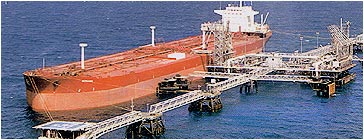|
|
Home Page | Photo Page | What's New
Page | Contact Page | Oil
& Gas Links
Cancellation of D’Arcy Concession and The Signing of
the New Agreement
Taimoortash, the powerful court minister was appoined by the government to negotiate with the company. The government wanted an arrangement on the basis of which Iran could own 25% of the company’s shares, a two Shillings royalty per ton of oil produced, the return to Iran of ¾ of the concession area, payment of tax by the company according to Iranian taxation rules and recognition of Iran’s rights in all company operations even after the termination of the terms of concession.
Once those conditions were accepted, the government was ready to extend the agreement for another 20 years period. Negotiations continued until 1931. In that year, Iran’s oil income plunged to 30 thousand pounds or a quarter of is revenue of 1.28 million pounds in the previous year. The company blamed global recession for the fall in revenues. But Reza shah who was unhappy with lengthy negotiations and repeated company pretexts, lost control, got hold of the oil files and threw them in the heater to burn. He then ordered his ministers to abolish the D’Arcy concession. The company was immediately informed of the Shah’s the D’Arcy concession.
The company was immediately informed of the Shah’s instructions, and the parliament (Majlis), in its 10 th session confirmed his decision.
In a stronglyworded memo, the British government voiced objectio to the action taken by Itan. Sever warships were dispatched to the Persian Gulf, and a complaint was filed with the League of Nation … the present Untied Nations. The Security Council, however, advised the two sides to find a solution to their problem through negotions.
Iranian and company representatives held their talks-first in Europe and then in Tehran-until 24 April 1933. They reached agreement on all principle matters, except the renewal of D’Arcy Concession, which was to terminate in 1951, but Cadman insisted that it should be extended for another for another period of 30 years. Finally, the Shah himself intervened, and a new agreement which included the extension of the oexssion, was concluded.
|
The Second World and Oil
The Second World War proved the rising importance of oil. Allied air forces in the Middle East, the Far East and Europe were mainly reliany on Abadan for fuel. In August 1944 the Sovernment sent its foreign minister to Tehran for an oil cancession. The negative response of the Iranian government which had decided to adstain from granting concessions until the end of the war, enraged the Soviets, and the Tudeh (comminutes) Party held anti-government demonstrations and rallies across the country.

|
Mosaddegh and the Anti-Concession Law
|
Meanwhile, Mosaddegh took the anti-concession bill to the consultative assembly (Majlis), which was passed on 2 December 1944. Second World War came to an end in 1949, and allied forces agreed to pull out of Iran in 6 months time. The Soviets, however, annoyed of the Iranian government’s response, did not abide by the agreement. Finally, the conclusion of “Ghavam-Sadchikov” agreement brought with it the withdrawal of Soviet foraces from the country.
| |
Nationalization of Oil
|
Election campaigns of the 16 Majlis, the assassination attempt against the Shah on 4 February 1949, Ayatollah Kashani’s exile, assassionation of Hajir by Fadaiian-e-Islam on 4 November 1950, the National front’s succes in Tehran, and the return form exile of Ayatollah
Kashani, were some of the major events that further heightened discussions on the oil issue. The “Gass-Goldhsyan” agreement as the outcome of the Iranian government and company negotiations, was taken to the 14 Majlis on its final davs. Thus the 16 Majlis had to take up relevant discusions. The agreement would increase royalty earnings of the government, but would not serve the mani purpose or the rights of the Iranian people. This came at a time when agreements such as the 50:50 profit sharing had become the norm of the day in The Second World and Oil The Second World War proved the rising importance of oil. Allied air forces in the Middle East, the Far East and Europe were mainly reliany on Abadan for fuel.
In August 1944 the Sovernment sent its foreign minister to Tehran for an oil cancession. The negative response of the Iranian government which had decided to adstain from granting concessions until the end of the war, enraged the Soviets, and the Tudeh (comminutes) Party held anti-government demonstrations and rallies across the country.
more ... back
|
Home Page
| Photo Page
| What's New
Page
| Contact Page
| Oil
& Gas Links
|
|
|
aa |
|